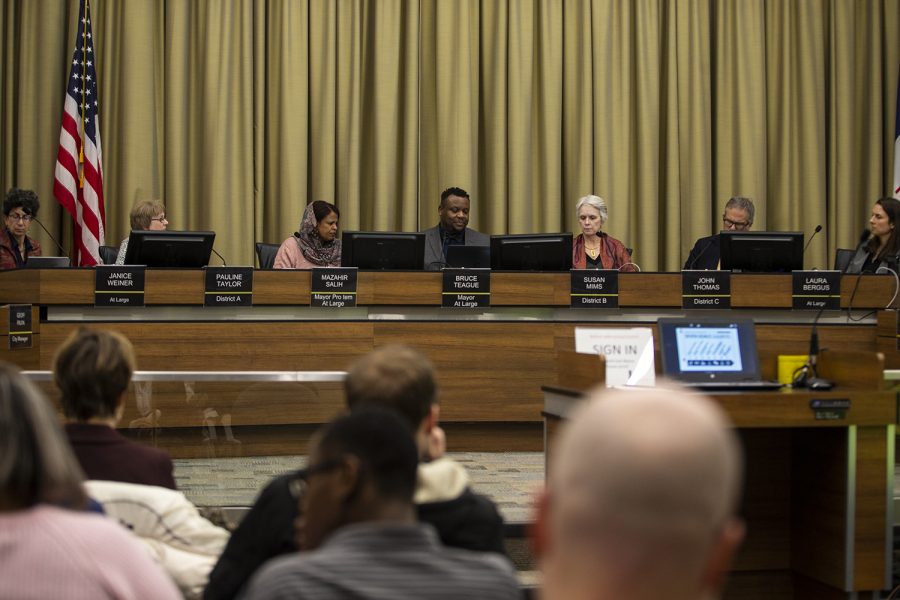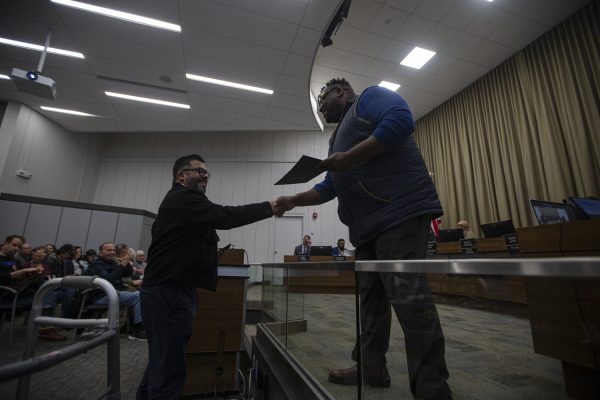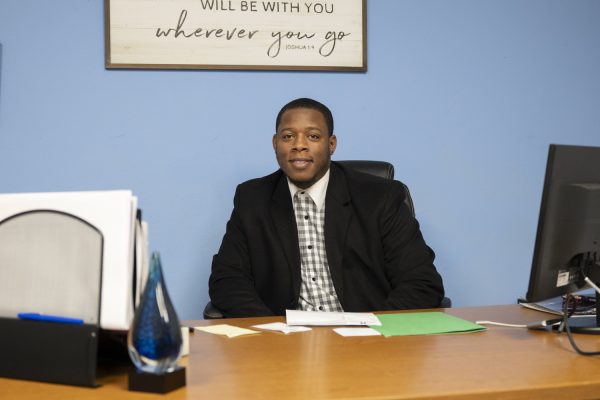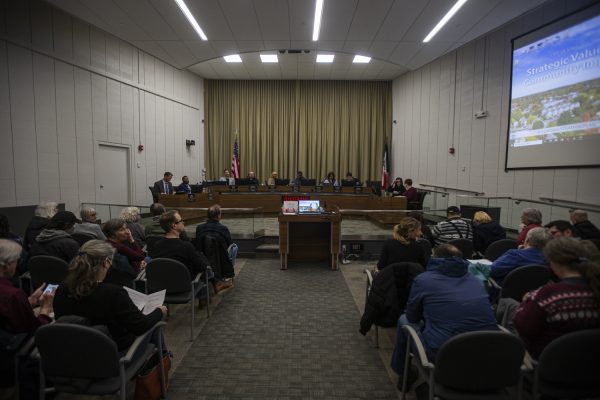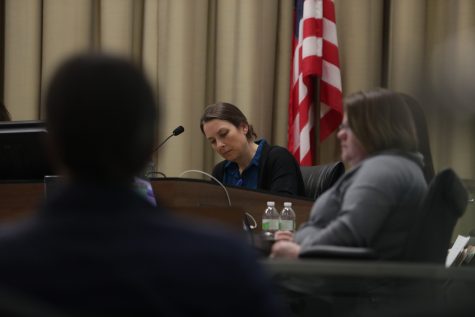CommUnity to hire law enforcement liaison, receives city council support
As part of the preliminary police plan, Iowa City is looking to increase the relationship between trained mental health crisis respondents and law enforcement agencies to best respond to crises within the community.
Nichole Harris/The Daily Iowan
The Iowa City City Council is seen at an Iowa City City Council meeting on Tuesday, Feb. 18, 2020. (Nichole Harris/The Daily Iowan
February 3, 2021
CommUnity Crisis Services and Food Bank, a local organization providing Iowa City and Johnson County residents with a number of physical and mental health resources, will begin the process of creating and hiring a law enforcement liaison.
This liaison will work in part with local law enforcement agencies and CommUnity to assist trained mental health crisis respondents with their calls, and ensure the situation is safe and secure before the respondents begin resolving the situation.
The liaison will also connect those involved with the appropriate resources and services.
Executive Director of CommUnity Crisis Services and Food Bank Becci Reedus, as well as City Manager Geoff Fruin, both gave a presentation on this program to the Iowa City City Council on Tuesday.
Fruin reminding those in attendance that this liaison position is an extension of the preliminary police plan he proposed to the council in December 2020.
RELATED: City Council will use individual community leaders to gather diverse public input
In addition to Reedus and Fruin, Foundation 2 Crisis Services Chief Operating Officer Sarah Nelson gave a presentation at the city council meeting, and said a similar program has been implemented in Cedar Rapids in partnership between Foundation 2 and Cedar Rapids Police Department.
She said Foundation 2 Crisis Services has seen success with this program.
“The program has been very successful,” Nelson said. “Having that impact where law enforcement are really happy to have the liaison on the team and have somebody that has that expertise on mental health and can assist on those calls.”
Fruin said this plan prioritizes having individuals trained in responding to mental health crises respond to those specific calls.
However, he said it also acknowledges that there will still be calls where it is deemed most appropriate to have a law enforcement officer respond to the scene with one of these individuals.
“Our goal is that we want to continue to work towards preventing [mental health situation] calls, and then of the ones that do come in, pushing those to a non law-enforcement response,” Fruin said. “But the plan also recognizes and calls for service data where it recognizes as well, that not all calls can can be safely responded to by a civilian team, and that we are going to have crisis calls that require a law enforcement presence, and that sliver of calls that we’re really aiming at with with this partnership here.”
During the city council meeting, the council voted to approve the creation of the liaison position 6-1. The only dissenting vote was City Councilor John Thomas, who during the meeting said he would have preferred a work session with city council to further discuss this issue.
Before the city council discussion, several members and supporters of the Iowa Freedom Riders voiced their concerns and issues with this program. The group led protests against police brutality throughout the summer, and have called for defunding of the Iowa City Police Department. Their demands led the city council to commit to creating the plan to restructure the police department in June.
Many said that they do not think the city council is intentionally listening and applying feedback and recommendations from the group to their decisions.
“You can best serve your BIPOC community by actually listening to their needs and responding to them,” Iowa City resident and IFR member Raneem Hamad said. “The most frustrating thing here is that every member of city council and the city manager have explicitly ignored feedback and haven’t even attempted to publicly discuss the feedback, or why they feel comfortable ignoring the hypocrisy of proposals.”
Iowa City resident and Iowa Freedom Riders member Emilia Roberts said she believes in order to best serve the community, and implement safe, successful community policing practices, the city council should listen to the group’s suggestions.
“I think it would be in everyone’s best interest for you guys to listen to IFR and just help us help you,” Roberts said. “Help us help our community, this is something that we are really passionate about.”
City Councilor Laura Bergus addressed this concern voiced by several community members, and said although the city council may not pass agendas that appeal to all community members, they are still listening to and representing that same community.
“Especially with the public comment and with the co-responder position, we’re hearing a lot of ‘you’re just not listening, or you’re just ignoring us, or you’re going against it, or you’re pretending or performing’,” Bergus said. “As an elected official, it is my job to speak for and represent the community. I was put in this role to do that, so you don’t have to agree to it, but I hope we can talk and if we do disagree, it’ll be respectful.”
Iowa City Mayor Bruce Teague said many community members, including Black community members, still need the resource of calling 911 and are sometimes unaware of crisis intervention services.
Teague added that the city council has made an effort to listen to all voices, opinions, and recommendations of community members, and that this program will be a step in the right direction for Iowa City.
“I’m Black, and I talk to people in our community,” Teague said. “I know that 911 is a call that people make. They make that call because a lot of people don’t know about the mental health crisis stabilization or the crisis line. There’s a lot of education to do. When it comes down to the people of this community, they are speaking, and there’s a lot of voices, there’s not just one voice that says they want one thing. This is a part of the process to get us to where we need to be. You may disagree with me and that is fine, but I am supportive of this program.”



